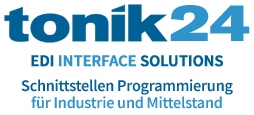By Andreas Lorenz
The logistics industry is faced with constant challenges that require the efficient and smooth processing of transport orders. In this technical article, we focus on the decisive factor: logistics interfaces. These seamless connections between different systems play a central role in the automation and optimisation of processes - from incoming orders to communication with subcontractors.
![]()
The key role of logistics interfaces in order management
In today's digital era, seamless communication between companies, customers and service providers is crucial. Logistics interfaces make this possible by automating the exchange of information between the various systems. This starts as soon as the order is received, when the data from the customer's ERP (Enterprise Resource Planning) is seamlessly transferred to the freight forwarder or transport company.
Incoming orders: Efficient acceptance of customer enquiries
Logistics interfaces significantly optimise the order entry process. Thanks to the direct connection to the customer ERP, order data is transferred automatically and without manual intervention. This not only minimises the potential for errors, but also speeds up the entire order acceptance process. The real-time transfer of relevant information enables haulage companies to start planning routes and allocating resources immediately.
Status messages: Increase transparency and customer satisfaction
Today's customers expect transparent, real-time tracking of their shipments. Logistics interfaces help to fulfil these expectations by automatically generating status notifications and sending them back to the customer. This automation process not only ensures continuous communication, but also minimises the manual effort required to update shipment statuses. Customer loyalty is strengthened as transparency and reliability create the basis for trust.
Proof of delivery as PDF: Effective documentation and archiving
The digitisation of delivery notes is another area in which logistics interfaces offer significant added value. The automatic generation of delivery notes as PDF documents not only makes archiving easier, but also enables faster invoicing and processing of transport orders. This helps to speed up the entire supply chain and significantly reduces administrative work.
Communication with subcontractors: Ensuring efficient cooperation
Logistics interfaces not only facilitate internal communication, but also play a crucial role in efficient collaboration with subcontractors. The automatic transmission of order information, route plans and other relevant data ensures smooth coordination between different players in the supply chain. This not only increases efficiency, but also minimises potential misunderstandings and errors.
Conclusion: Future-proof through logistics interfaces
At a time when speed, precision and transparency are of crucial importance, logistics interfaces offer a clear competitive advantage. From the automation of incoming orders to continuous customer communication and efficient collaboration with subcontractors - these seamless connections are revolutionising the logistics industry. Companies that rely on this technology not only position themselves as modern and customer-orientated, but also ensure sustainable competitiveness in a constantly changing industry.
Andreas Lorenz is an expert in the integration of logistics interfaces and has successfully implemented numerous projects in this area. His expertise lies in the development of customised solutions for the optimisation of logistics processes.
More about logistics interfaces: https://www.tonik24.com/edi-solutions/
 ES
ES  DE
DE  EN
EN 

